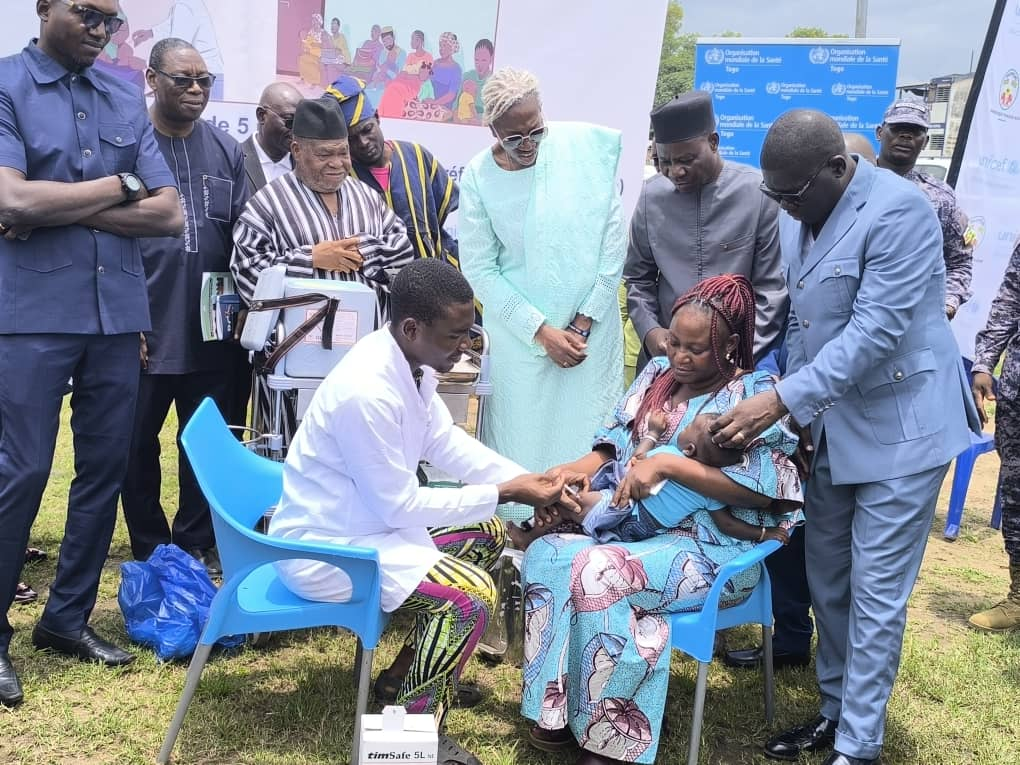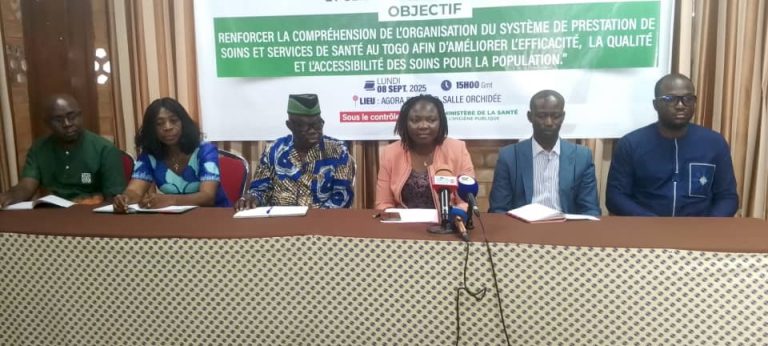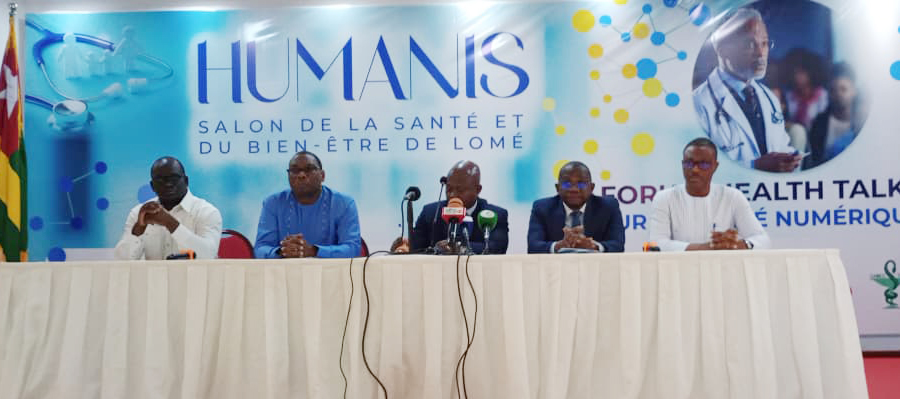Togo, the first African country to roll out the R21 malaria vaccine nationwide
- Posted on 11/09/2025 14:58
- Film
- By abelozih@sante-education.tg

Extract from the article: On September 4, 2025, in Sokodé, Professor Tchin Darré, Minister of Health and Public Hygiene, officially launched the introduction of the R21/Matrix-M malaria vaccine into Togo's Expanded Program on Immunization (EPI).
On
September 4, 2025, in Sokodé, Professor Tchin Darré, Minister of Health and
Public Hygiene, officially launched the introduction of the R21/Matrix-M
malaria vaccine into Togo's Expanded Program on Immunization (EPI).
The
Ministry of Health and Public Hygiene, with the support of Gavi, the Vaccine Alliance,
the World Health Organization (WHO), UNICEF, AMP, Malaria Consortium, and
OPT-MVAC, is officially introducing the malaria vaccine into its Expanded
Program on Immunization (EPI). This introduction represents a major step
forward in the fight against malaria, which remains the leading cause of
morbidity and mortality among children in the country.
Togo
thus becomes one of the African countries to introduce this innovative vaccine
on a national scale, with the aim of reducing malaria-related morbidity and
mortality among children under five.
"It
is important to prevent this disease in children, hence the need to introduce
this vaccine into routine immunization. This decision reflects the commitment
of the country's highest authorities, as set out in the National Strategic Plan
to Combat Malaria (2023-2026), whose vision is that "communities and
families will be free from the burden of malaria by 2030, enabling them to
contribute effectively to the country's development. I would like to reiterate
the government's gratitude to its partners for their multifaceted
support," said Professor Tchin Darré.
"The
WHO is providing technical and strategic support for this process, in line with
the Global Roadmap for Immunization. This is a crucial opportunity not only to
protect children against malaria, but also to strengthen health systems and
improve the overall performance of the routine immunization program," said
Dr. Hilaire Ouédraogo, WHO Representative in Togo, who congratulated the
national authorities for their efforts to improve the health of the population.
With
this introduction, Togo becomes the 22nd country to include the malaria vaccine
in its national immunization program. It also becomes the first country to
introduce it nationwide in its expanded program on immunization. The vaccine is
being rolled out in all 39 districts of the country and has been administered
since September 1 to all children aged 5 months. This will certainly
significantly reduce hospitalizations and mortality among fully vaccinated
children. The total number of children expected to be vaccinated in the first
year is 270,000 across the country.
"The
introduction of the malaria vaccine in Togo strengthens the protection of
children against this preventable disease, which continues to claim the lives
of children under the age of 5. UNICEF is committed to supporting the
government's efforts to ensure that every girl and boy living in Togo,
regardless of where they live, has access to essential health care in a manner
that respects equity. As for community health workers, your commitment is
essential to the complete vaccination of our children," said UNICEF
Resident Representative Dr. Erinna Dia.
This
introductory activity is supported by partners including Gavi, the Vaccine
Alliance, which, through alliance partners such as WHO, UNICEF, AMP, and the
government, supports the purchase, logistics, review of tools, and deployment
of the vaccine. In addition, Gavi is investing in cold chain infrastructure,
human resources, and data collection systems.
"This
is a great moment for Togo and for all of us working to defeat malaria... With
the malaria vaccine now deployed in 22 countries and more than 31 million doses
already delivered, continued funding and investment will be essential to ensure
that this vital new tool reaches everyone who needs it and supports the fight
against one of Africa's deadliest diseases," said Riswana Soundardjee,
Senior Country Manager (Togo, Senegal, and Liberia), Gavi, the Vaccine
Alliance.
The
R21/Matrix-M vaccine, which is completely free of charge, will be administered
in four doses starting at 5 months of age and will complement other malaria
control interventions already in place, such as the distribution of mosquito
nets, indoor residual spraying, seasonal chemoprevention, chemoprevention for
pregnant women, intermittent preventive treatment for infants, and early case
management with artemisinin-based combination therapies. This initiative is
part of national efforts to improve the health and well-being of Togolese
children.
This
launch is the result of coordinated efforts between the Expanded Program on
Immunization (EPI), the National Malaria Control Program (NMCP), technical and
financial partners, and community stakeholders. The Inter-Agency Coordination
Committee (IACC) and the National Organizing Committee (NOC), with technical
and financial support from GAVI, WHO, and UNICEF, played a key role in planning
this introduction.
In
parallel with these actions, communication and social mobilization activities
are being carried out to inform families and mobilize community leaders and
local elected officials in favor of vaccination. Mothers' clubs and Red Cross
fathers' clubs are also being called upon to relay key messages, raise
awareness among households, and encourage families to have their children fully
vaccinated.
The
Ministry of Health and Public Hygiene and its partners are calling on all
parents, community leaders, local authorities, and civil society actors to
actively support this introduction so that every eligible child receives all
doses of the malaria vaccine.
Malaria situation in Togo
In
Togo, malaria is endemic throughout the country and is transmitted year-round,
with an increase during the rainy seasons. The main pathogen is Plasmodium
falciparum (94.6%), followed by Plasmodium malariae (3%) and Plasmodium ovale
(2.4%).
In
2023, Togo recorded approximately 2.14 million cases of malaria and 3,456
deaths, according to the WHO's World Malaria Report 2024, highlighting the
continuing high burden of this disease in the country. During the period from
2017 to 2023, the incidence of malaria rose from 168‰ to 192‰, marked by an
increasing trend in malaria cases.
The
epidemiological situation specific to children under 5 shows that they account
for one-third of malaria cases (34% in 2021 and 32% in 2023), 53% of severe
malaria cases hospitalized in 2023, and two-thirds of malaria-related deaths
(64% in 2021 and 65.8% in 2023).
Source:
MSHP




